| T O P I C R E V I E W |
| stephanvdz |
Posted - Jul 26 2008 : 8:50:47 PM
I made a statement on the TVSS description based on the serial number of the lenses matched with the year of production of the cameras, and this statement opens a question ;-)
First : The f2 lenses are post war jena production... the 1,5 are 1938(prewar production)... and all those 1,5 are seen on earlier TVSS. Why did they use a prewar uncoated lens instead of an available post war coated lens ? being Jena or ZK... could those lenses date from the Ribentropp/Molotov agreement period ?
May be that some TVSS could be earlier than 1948 ?
Secondly : Are all TVSS bayonet the same ? As I see there are no external bayonet, the mount is an uncomplete contax mount with only the internal linkage ... (if not show examples)... or in 1948, They would have access to a stock of original contax bayonet at the factory (as in the early Kievs)... why did they design an incomplete system..? hence the absence of external bayonet forbids the use of biogon 35 and Sonnar 85/135 lenses...
My hypothese is that the TVSS was designed during the war or even before...
Stephan |
| 94 L A T E S T R E P L I E S (Newest First) |
| Vlad |
Posted - May 11 2014 : 9:46:37 PM
Great find, Alexander! Congratulations! I've seen this camera before once, it's quite rare!
By the way, seeing this thread reminded me: I did contact Zeiss Historical society but never got an answer from them... too bad.
Cheers,
Vlad |
| Luiz Paracampo |
Posted - May 11 2014 : 6:09:34 PM
Leningrad was the city of new prototype cameras after the war.
The GOI, Leningrad FCH, why not the TSVVS?
LOMO already had all VOOMP tools and skilled technicians... It was needed only to adapt Zeiss Contax normal lenses.
Regards
LP |
| Jacques M. |
Posted - May 11 2014 : 10:37:31 AM
What a beautiful TSVVS, Alexander! All my congratulations!
This one is "blind", without inscriptions. Some are known to be so, but they are very rare. Yours seems original (= no erasure)
I think that this one is a 1949 one by the "angular" corner of the cover just above the central screw.
Concerning the lens, this Tessar was delivered the 12th of january 1948, by Thiele. To compare with many TSVVS equipped with a Sonnar from the 4th of december 1947 (batch 3089501 to 900).
Amitiés. Jacques. |
| AlexanderK |
Posted - May 11 2014 : 05:29:54 AM
I allow me to recall this old topic because of my last fund.
This camera was sold as "Leica replica or prototype", but it is definetly TSVVS. Very interesting is the "virgin" top plate without any engraving and the lens CZJ Tessar 3,5/50. The lether case has also no name.
What could it be? Really a TSVVS prototype or a camera for some special case? Nevertheless I think it is a very interesting example.
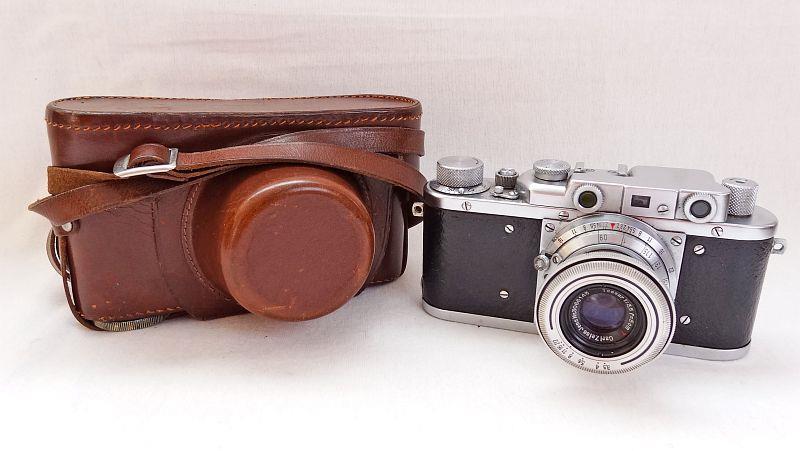
http://www.ussrphoto.com/UserContent/1152014_bbb1_295.jpg
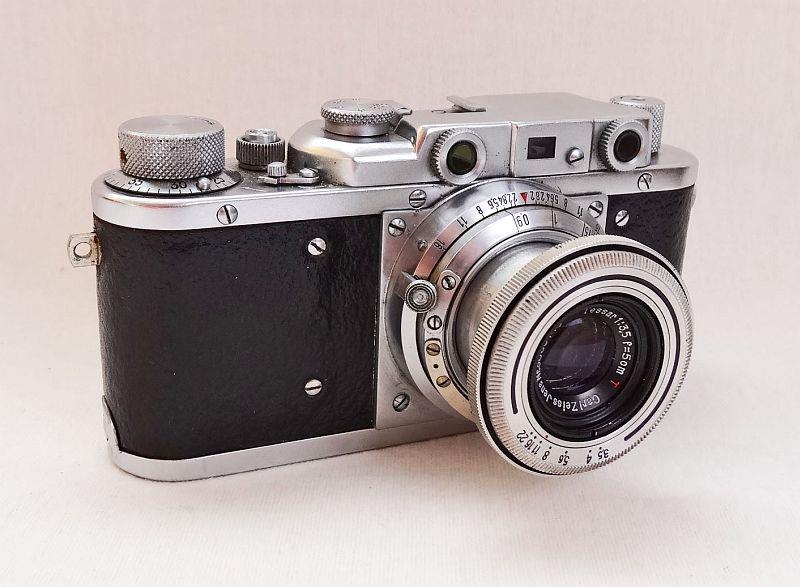
http://www.ussrphoto.com/UserContent/1152014_bbb1_296.jpg
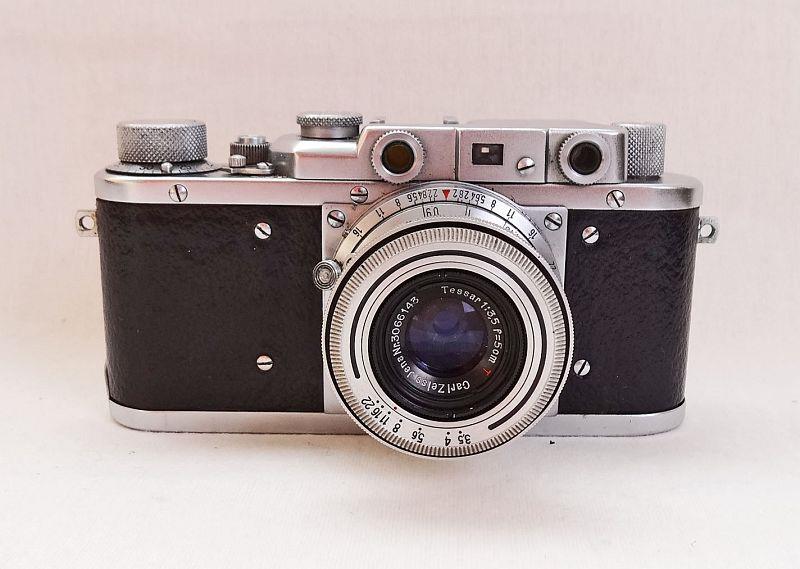
http://www.ussrphoto.com/UserContent/1152014_bbb1_297.jpg
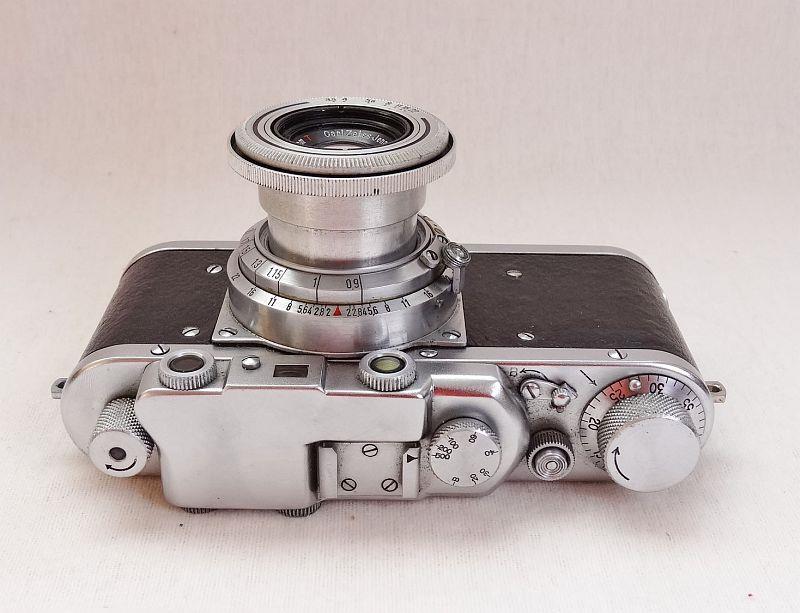
http://www.ussrphoto.com/UserContent/1152014_bbb1_298.jpg
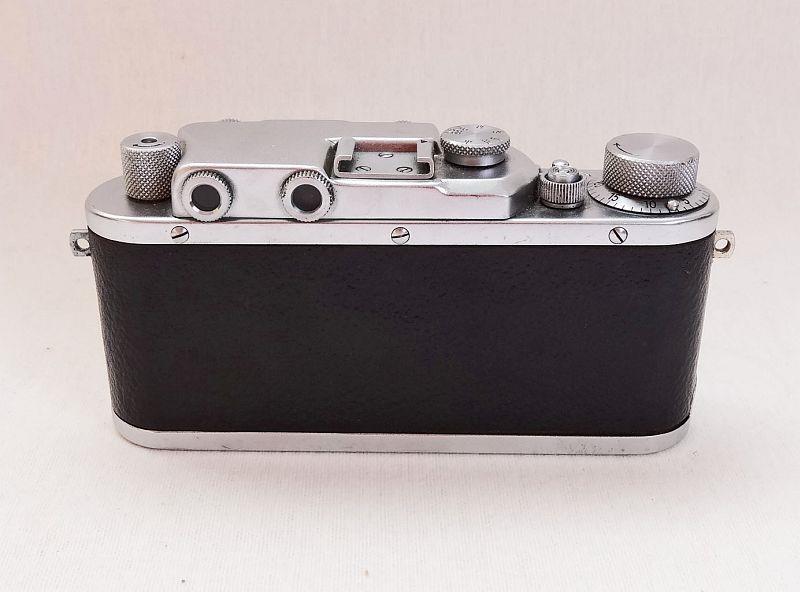
http://www.ussrphoto.com/UserContent/1152014_bbb1_299.jpg
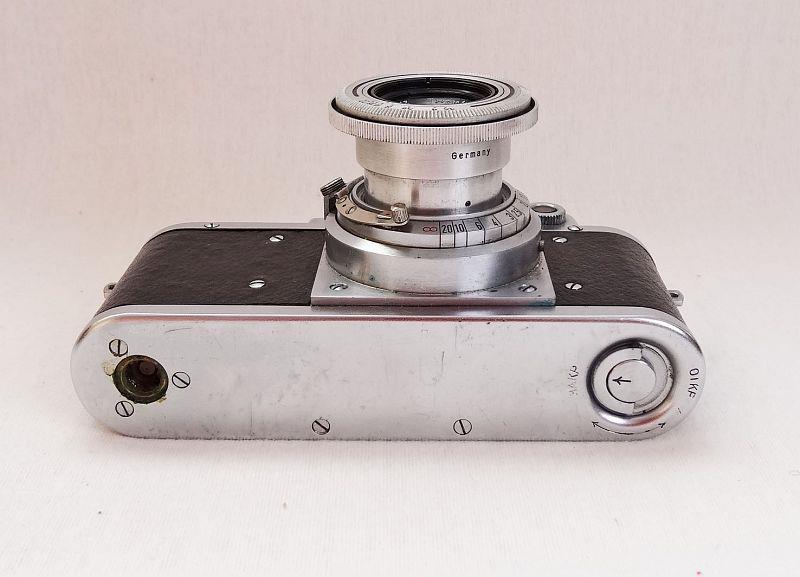
http://www.ussrphoto.com/UserContent/1152014_bbb1_300.jpg
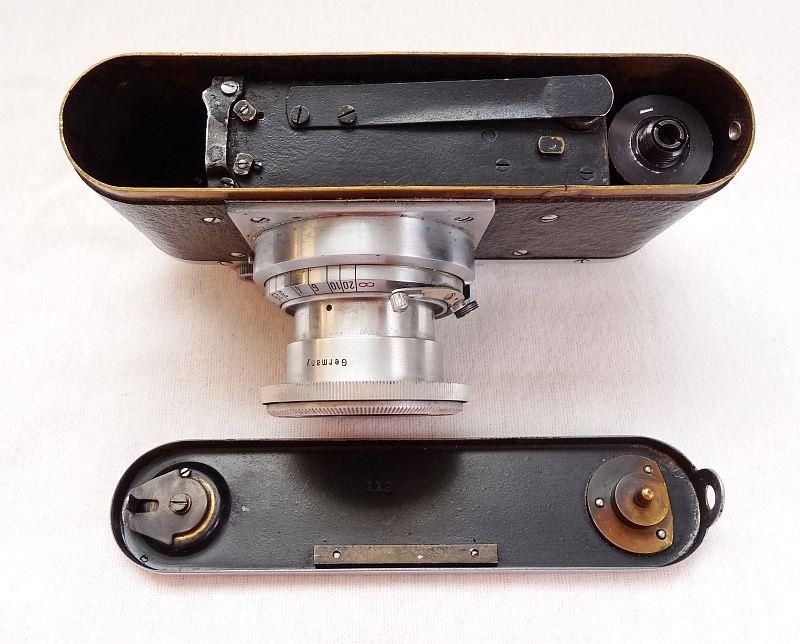
http://www.ussrphoto.com/UserContent/1152014_bbb1_301.jpg
Regards, Alexander |
| Vlad |
Posted - Apr 24 2011 : 8:14:19 PM
Bill, I can also follow up in Russian if needed. Let me know.
Thanks,
Vlad. |
| nightphoto |
Posted - Apr 22 2011 : 9:39:24 PM
Hi Luiz,
First let's see if they are responsive about TSVVS. If so then we will know more. Then if the answer is that they have made TSVVS, maybe we can ask about other camera production that they may be responsible for!
Regards, Bill
|
| Luiz Paracampo |
Posted - Apr 22 2011 : 9:04:40 PM
You may write in English They will answer. Why not use the opportunity also to ask about TSVVS2 (or whatelse it could be)?
Regards
LP |
| nightphoto |
Posted - Apr 22 2011 : 8:47:40 PM
Well .. for what it is worth, I have sent an e-mail in English to that e-mail address asking if anyone there has information about the camera. I included two photos of one of my own TSVVS cameras in the e-mail.
I will post it here if there is any response at all!
Regards, Bill
|
| Zoom |
Posted - Apr 22 2011 : 07:35:11 AM
quote:
Originally posted by nightphoto
If the e-mail link will work!
I found only this address: 106eomz@ip.sitek.net |
| Luiz Paracampo |
Posted - Apr 21 2011 : 11:37:03 PM
the Pismo(contact) and Karta saite (Index) icons do not work!
LP |
| nightphoto |
Posted - Apr 21 2011 : 11:12:06 PM
This is very interesting and may be a real possibility. Maybe someone who knows Russian could write an e-mail to them and ask if anyone there remembers if they were making any 35mm cameras in 1949 - 1950. If the e-mail link will work!
Regards, Bill
|
| Zoom |
Posted - Apr 21 2011 : 12:51:18 PM
quote:
Originally posted by Zoom
I'm only think that "the East German version" is the most probable, but I havn't facts. :(
Or this plant: http://www.106eomz.ru/ (106-é ýêñïåðèìåíòàëüíûé îïòèêî-ìåõàíè÷åñêèé çàâîä -- 106-d experimental optical-mechanical plant), located in Moscow, founded in 1941, and 60 years has been producing equipment for the Topographical service of Armed Forces.
|
| nightphoto |
Posted - Nov 01 2010 : 11:21:41 AM
I think that it would be very interesting to see the kind of comparison that was done on DVDTECH, only between a Leica and TSVVS. I don't have the knowledge to take the cameras apart (or more precisely, to put them back together) or I would do it. A comparison like that might possibly lead to some answers as to where TSVVS was made.
I also think that probably the Russian military officers were using German cameras as a preference before and during the war (just as many Russian professional photographers did ... for example Rodchenko used a Leica), and so they wanted something more like the Leica and Contax for their own use ... better quality build and appearance, but with Soviet insignias ... to make it a Soviet camera! What could be better than to have the defeated Germans make them the TSVVS to the high standards of both Contax and Leica!
Regards, Bill
|
| Jacques M. |
Posted - Nov 01 2010 : 04:29:48 AM
I had forgotten DVD's site on which there are some very interesting pictures... As the more there are also pictures of Zorki 1949 which allow precise comparisons.
No doubt: almost all is different. Even the spring for release shutter has a strange and original curve. It looks as if TSVVS were inspired by Leicas, not being exactly copies as Fed and Zorki can be.
Amitiés. Jacques.
|
| nightphoto |
Posted - Oct 31 2010 : 7:40:50 PM
I think the differences in size of the bodies between a FED and TSVVS is not just due to the thickness of the metal or any deformations of the body shell, but it was designed and manufactured using its own dimensions and was never made to be the same as, or interchangeable with a FED. Of course, just like the FED, it is made to be a Leica copy and so has a similar design.
If I had my cameras unpacked I could measure exactly the size of both the FED body and the TSVVS body. It may be somewhat more than 0.5mm in difference, I can't remember. When I unpack them I will make accurate measurements and post them if no one else does it first.
If you look on the DVDTECH page that Ulrich gave a link to, at the bottom, you will see that the TSVVS has many more differences than similarities with the FED, in design as well as in materials and quality of manufacturing.
Regards, Bill
|
| uwittehh |
Posted - Oct 31 2010 : 05:24:31 AM
Hi Bill and Jacques,
ok, if it only 0.5mm I also think that it doesn't fit because of the thickness of the material or because of very small deformations of the body shell. By the way, the numbers stamped on the shutter and the bottom plate are also inside the body shell behind the film pressure plate and inside the body on the top where the rangefinder cam sits.
On mine the number is also scratched on two places of the lens mount, on the inner lens mount and on the back of the lens mount plate. A funny thing, there was a 90 scratched on, which is striked through, and the right number 85 is scratched in.
Jacques, just before you have posted your message I have reassembled the camera and because it was very hard work to fix the lens mount back I think, I will not dissassemlbe it the next days again :-) But I will do it as soon as possible. But you can see some of the differences on Yuris site at the bottom of the site:
http://www.dvdtechcameras.com/collect/fed/1/18.htm
Ulrich
http://fotos.cconin.de |
| Jacques M. |
Posted - Oct 29 2010 : 5:06:44 PM
You are right, Bill: impossible to put a Fed bottom plate on the TSVVS (and inversely). It's a more a question of thickness of the metal than a problem of dimensions...
Your disassembling is most intersting, Ulrich. I'm not skilful enough to risk such an operation on my camera... Perhaps you could give us some pictures. Of course, it's exciting to compare the same pieces Fed vs TSVVS...
All that to conclude that TSVVS were probably made in Germany. But by whom exactly?
Amitiés. Jacques. |
| nightphoto |
Posted - Oct 29 2010 : 10:52:48 AM
Hi Ulrich and Jacques,
I am in the process of moving from one house to another so I can't compare the size of my FED to my TSVVS. However, from my memory, if you place them next to each other they seem the same size, but if you try to put a FED bottom plate over the TSVVS body while its plate is removed, I think you will see the difference. It is not large, probably just 0.5 mm or so ... but the bottom plates are not interchangeable as far as size.
Congratulations Ulrich! I think that as you use the camera and examine it, you will see why I have serious doubts that it was made in the USSR, as I have expressed in some of the posts in this thread.... but no doubt is a Soviet camera in that it was made especially for the Soviet military.
Regards, Bill
|
| uwittehh |
Posted - Oct 28 2010 : 5:59:47 PM
Btw, when I inspect the bag of the TSVVS and compare it to the pictures of Bill's bag (it looks the same), this bag seems to be a Leica bag. The leather, the seams, the felt and the velvet inside are like a bag from a Leica. Could it be that there where used Leica bags with a re-stamped or new sewed snout on it?
Ulrich
http://fotos.cconin.de |
| uwittehh |
Posted - Oct 28 2010 : 4:27:07 PM
Jacques,
thanks :-) I am really proud to own one now. I will put the serial no and the lens number in the Wiki the next days. The lens serial number (Sonnar 2.0/50) matches, it starts with 30.
By the way, it is really interesting, it lies disassembled on the table now and there is NO part that is like any part of an early or later FED. Even the wind brake spring, the small part that holds the 2 screws of it, the screws itself, the spring under the rewind lever, everyting is different. The shutter curtain material is different and every screw on the camera.
It seems to look as if it's a Leica, but I have disassembled 2 or 3 prewar Leicas (IIIa and IIIb) before and they are also different to this beast :-) So which factory has built it...?
Ulrich
http://fotos.cconin.de |
| Jacques M. |
Posted - Oct 28 2010 : 4:15:00 PM
That's good news for you, Ulrich!
What are the serial numbers of the body and lens? It seems they are not in the wiki.
I have just compared mine (a 1949 one) with any of my Fed and you are right: they have the same size. So...
The problem remains open!
Amitiés. Jacques. |
| uwittehh |
Posted - Oct 28 2010 : 3:30:30 PM
So, I've put a lot of money together and bought me a TSVVS :-)
It arrived today. Wow, what an amazing camera. I've never seen such a solid made USSR camera until now. The chrome is shiny as it is on a Contax.
I have compared it to the pictures I have found on the web and it is an original one. If this is a fake I am a fake too :-)
But there is one thing... Bill, you have said that the body of a TSVVS is a bit bigger than a FED 1 one. The camera that I have has the same body size then a FED 1. So how can this be? Did they have changed the body size in the later production period? I believe that mine is real, it has a brass body, rangefinder cam, all viewfinder lenses and rings, numbers stamped on body and bottom, everything is like I can see it on the pictures of yours.
To warm up the discussion where it was made... it's hard to say, soeme facts say that it's sowjet made (the screws and the inner body) some facts say that there must be german Zeiss(?) or Leica(?) made parts in it (chrome and leather like Contax, the smooth cocking and the releasing like Leica).
Ulrich
http://fotos.cconin.de |
| nightphoto |
Posted - May 15 2010 : 7:43:11 PM
Yes Zoom, I have noticed that even with the original FS-2 GOI and KMZ Fotosnipers that the plant logo is shown along with the military logo of Star - Hammer - Sickle. Also the factory logos are seen on binoculars and lenses made for the Soviet military.
So this might make it more likely that the camera was made in Soviet Occupied East Germany since it would be unlikely that a German logo would have been acceptable on a Soviet military camera ;-) Also may be the reason that we do not see documents like passports and manuals for it.
Regards, Bill
|
| Zoom |
Posted - May 15 2010 : 5:13:42 PM
quote:
Originally posted by nightphoto
What about the Novosibirsky Pribori Zavod (NPZ) in Novosibirsk which made the Vostok around the same time? Maybe they are a candidate too?
It'll be the very good candidate, but there is no NPZ plant logo on the camera... :( |
| Zoom |
Posted - May 15 2010 : 5:04:40 PM
quote:
Originally posted by Luiz Paracampo
For some reason it is written atop this camera "Òîïîãðàôè÷åñêàÿ Ñëóæáà ÂÂÑ" ("Topographical service of the Air Forces")...
However it can be more probable another variant...
Forget the first variant forever! ;) There was only one Military topographical service in Russian Imperia, Soviet Union and Russia Federation again. Only one common, general service. In the direct subordination to the General Staff.
Btw., it was difficult to the Berdsk factory to made cameras... See the GKO decree #2445 title: http://www.zenitcamera.com/archive/misc/gko-docs.html#n2445 ;) |
| nightphoto |
Posted - May 15 2010 : 01:01:39 AM
Hi Luiz,
Although it is another theory worth considering, manufacture of TSVVS at Berdsk has no evidence ... just another possibility. I believe that the Military Topographical Service of the Armed Forces is not part of the Air Force, even if they did use planes to photograph from and aeronautical cameras at times. Usually the Topographical Services of different countries are attached to the Army as they are the ones mostly in need of topographical information (although of course all services need it).
Also, I would think that if the factory at Berdsk made the TSVVS then they would have used a FED as an exact model, and in the case of the TSVVS there is really not too many similarities, besides the overall "Leica copy" look of the camera. The TSVVS has different body measurements, smaller viewfinder window, different shutter cage design details, different metals used, different film pressure plate, a very high quality finish, different coverings, and many other details that are not similar to the FED. If made at Berdsk, I would think that more of the details would match up with the FED, but maybe more handmade rather than totally different designs.
And as far as you final point, if 300 to 1000 cameras were made in a country besides the Soviet Union, for example East Germany, but were made expressly for the military on a specific military order, I think that these cameras would have been all in the hands of Soviets, in the Soviet Union, shortly after they were made, and thus would not have shown up earlier than other Soviet cameras became known to the West. And, as we know, many East German military cameras, such as those used by the STASI were only commonly known to the collectors of the West with the fall of the Berlin wall.
But, Berdsk should not be ruled out either! Eventually we may see some documentation but until then all theories should be discussed and considered. I so far have on my list: Almaz Factory ... Berdsk Factory ... Unknown East German Factory ... Zeiss Jena ... LOMO ... MMZ - Çàâîä N297 ÍÊÂ - Ìàðèéñêèé ìàøèíîñòðîèòåëüíûé çàâîä ... Unknown Soviet Factory ... and ... FED. No doubt some are less likely than others, and no doubt there are other factories and theories to be added..... just take a look at the list of factory logos on the KMZ website that Zoom has provided a link to.
What about the Novosibirsky Pribori Zavod (NPZ) in Novosibirsk which made the Vostok around the same time? Maybe they are a candidate too?
Regards, Bill
|
| Luiz Paracampo |
Posted - May 14 2010 : 8:09:59 PM
Hi All
Receently reading Abramov’s site about TSVVS (or VTSVS) http://www.photohistory.ru/1207248179842956.html whose text I translate, I formulated a new theory about these cameras. Please observe:
This is na hybrid camera. On a FED body it is mounted a bayonet from "Kiev" (it was used only the internal bayonet).
For some reason it is written atop this camera "Òîïîãðàôè÷åñêàÿ Ñëóæáà ÂÂÑ" ("Topographical service of the Air Forces") (believing that this camera was used in any way for topographical shootings purposes is impossible - read "Aerial camera" section in Georgy Abramov’s site).
However it can be more probable another variant of reading the name (if to read it on a circle) it can be "Âîåííî-òîïîãðàôè÷åñêàÿ ñëóæáà Âîîðóæåííûõ ñèë" ("ÂÒÑÂÑ") ("the Military-topographical service of Armed forces") (this service incorporating Scientific research institute of Military-topographical service, among other things, in particular prepared a book edition about aerophototopography). These cameras were prepaired with trophy lenses "Carl Zeiss Sonnar 1,5/50" or "2,0/50". Chambers were made in a high technological level and were finished with genuine leather (black or blue). Judging by numbers in the first year of manufacture (1949) it has been let out by the little more than 300 copies (311-312?), and total release for two years of manufacture has not exceeded 1000 copies.
Remembering that the FED concern were owned by the “Air Force”, as well as the former Berdsk factory, Taking into account that people at Berdsk plant were now experienced in how to build FED cameras, observe that the time lapse 1946-1949 was sufficient to put into operation a new line of cameras with the “trophy” Sonnar lenses. Of course, it was much more convenient in building the new camera with mounts intended to accept the German lenses. The small production denotes a hand made construction. The small universe of available lenses limited the production of bodies, so high qualities in slow production pacing were available At those years Siberia had the highest professionals of Russia, not only due the “War Protection” given to intellectuals and skilful people, but also based on traditions, and why not to believe in an extra “natural German cooperation” coming together the “trophy lenses”? Of course studying the Politics of the period, all Scientific research institutes had a symbiosis together a production plant. Why not this recently camera “orphaned” Berdsk factory could not be put into operation?
So, the afore mentined camera is evidently of Soviet production.
If not,we would know that, long before Soviet cameras were known in the West.
Regards
LP
|
| stephanvdz |
Posted - May 11 2010 : 03:26:35 AM
I think I've found the secret production plant, it is in France and still active
http://www.collection-appareils.fr/phpBB3/viewtopic.php?f=37&t=9185
may be somewhere in Gennevilliers or Boulogne-Billancourt... ;-)
Stephan |
| nightphoto |
Posted - May 06 2010 : 5:25:17 PM
Thanks for your valued opinion, Zoom.
I have also thought possibly East German for a long time. I think the mount is different from the Contax because it was made for a Leica-FED body ... not a Contax body. You can't just take a Contax mount and screw it onto a Leica-FED style body ... it has to be a new machined part.
If it was made as a special camera to give to high ranking Soviet military officers and other important people ("General's FED"), then there would be no reason to make it so that it would fit anything other than a 50mm Sonnar lens. If a telephoto or wide angle photograph was needed, it could just be ordered from a staff photographer or surveillance team. The TSVVS would have just been a fine trophy camera for normal photography and show. Excellent bright finish, leather or fancy covering, beautiful logo with Soviet hammer, sickle, and star, high-quality leather case, and the best quality captured German Zeiss Sonnar lens! What else can you ask for as a reward for heroic work for your country!
Also, the story that was told to Alexey Nitikin when he bought a TSVVS ... that it was originally bought by the man's father, a Soviet soldier, from a warehouse in Germany and that more than one could have been purchased ... has the ring of truth to it. Why would someone make up a story like that when selling a TSVVS ... a Soviet military item? Only someone who reads this forum or other discussions about TSVVS would even think to make up a story like that since the camera has Soviet markings on it.
And, as Zoom says, Zeiss had many factories in Germany, and probably also many non-Zeiss factories from which they bought parts (just a guess ... I don't know this for a fact). If the screws are not perfect, as Milos Mladek has relayed to Vlad in his letter, to me this might not be surprising in post-war Germany as many factories that supplied precision parts were targeted and destroyed through bombing by the Allies. And the Almaz factory was making aeronautical, rocketry, anti-missile defense, and other highly technical and technologically exacting equipment ... so why would they not have access to perfect tiny screws?
And, why no Soviet factory logo ... a leather case entirely unlike any Soviet camera case ... a brighter and finer chrome finish than on any Soviet camera ... leather and plastic coverings that are both unlike any seen on Soviet cameras ... and, the small stamped numbers on the bottom plate and shutter cage which are not seen on other Soviet camera (but are seen on German cameras)? Even the style of the engraved numbers and letters looks different than any Soviet cameras.
The history of the Zeiss factories and productions may not be completely known by now, just as it was only within the past few years that a more complete view of the "Contax to Kiev" story and that of the Jena Contax has become clear. There may still be things that are not known about the post war production of Zeiss and related or satellite factories at this time. The whole key is always to keep asking the questions and look for answers to them, while keeping an open mind, in my opinion.
Regards, Bill
|
| Zoom |
Posted - May 05 2010 : 3:32:15 PM
quote:
Originally posted by Jacques M.
Where? Jena?
Zeiss had many factories, not in Jena only... ;)
I'm only think that "the East German version" is the most probable, but I havn't facts. :( But: there is no plant logo on this camera (only lens has!).
Or the star etc. is this logo, may be a lot modified (see, for example, plant #297 logo: http://www.zenitcamera.com/qa/qa-logos.html#yoz ) -- but this version is unlikely. |
| Jacques M. |
Posted - May 04 2010 : 5:06:37 PM
Hello Zoom,
Why do you think of the East German ground? Where? Jena?
But Jena would be difficult, because of the mount which is not the same on Contaxes...
And what about the lenses which were used on TSVVS?
Kind regards. Jacques. |
| Zoom |
Posted - May 04 2010 : 4:23:32 PM
quote:
Originally posted by nightphoto
Also they have often made things for the military or Ministry of Defense and evidently did have some German expertise and personnel after the war.
;) All Soviet optic plants belong to the Ministry of Defense Industry (MOP = ÌÎÏ = Ìèíèñòåðñòâî îáîðîííîé ïðîìûøëåííîñòè), exclude FED (Aviation Industry, MAP = ÌÀÏ = Ìèíèñòåðñòâî àâèàöèîííîé ïðîìûøëåííîñòè).
The major portion of the "German personnel" worked in KMZ. |
| Zoom |
Posted - May 04 2010 : 4:08:41 PM
quote:
Originally posted by nightphoto
About the camera ... VTS-VS, what do you think about where and which factory made it?
I think that "the East German version" has an ample grounds to be the most probable. |
| nightphoto |
Posted - May 04 2010 : 3:50:27 PM
Alain,
Seems like if FED was part of the TSVVS project, then some FED parts would be used and no TSVVS parts look like they are the same as FED.
GOMZ may be more possible since there is the prototype c. 1952 that Milos Mladek owns (top of page 58 ~ Princelle) which shows that they will screw a lens mount plate on the front of a camera (even though it is Alpa bayonet mount). Also they have often made things for the military or Ministry of Defense and evidently did have some German expertise and personnel after the war. So maybe GOMZ - LOMO is another possibility.
Regards, Bill
|
| mermoz37 |
Posted - May 04 2010 : 12:43:56 PM
TSVVS ????
why not a "built junction" between FED and LOMO    ??? ???
please do not be blind by ideologies...
Alain |
| nightphoto |
Posted - May 03 2010 : 11:50:53 PM
Dear Zoom,
About the camera TSVVS or VTS-VS, what do you think about where and which factory made it? I would be very interested as to your opinion because your knowledge about the camera production history of the USSR is very good. Even if you don't know for sure, what is your opinion or the opinions of others that you may have heard?
And, as we all know or should know after a hindsight viewpoint into history of 65 years, the West was not goody-goody at all, nor was Germany, or the Soviet Union, or many of the other smaller countries in Europe, not to even mention Japan and China! And history has always been taught with a unique viewpoint in all or most countries and cultures that favors themselves to an larger or smaller extent!
Regards, Bill
|
| Zoom |
Posted - May 03 2010 : 4:59:55 PM
quote:
Originally posted by cedricfan
In East Germany things went quite other ways. The ruined country was robbed of most factories and skilled workers to USSR and what was left became a part of USSR soon closed from west.
You are not correct.
quote:
Originally posted by cedricfan
Already in 1945 communist party was founded...
You are not correct.
quote:
Originally posted by stephanvdz
Until the creation of DDR, there is only one Germany...
You are not correct.
I see that you learn another history. In your version it was only one goody-goody West and an innocent Germany. And the evil-terrible Russia... :( |
| Jacques M. |
Posted - May 03 2010 : 08:24:40 AM
Always about the lens track, I found some other early IIa (end 1949, beginning 1950)equipped with Carl Zeiss Jena Sonnars between 3000xxx and 310xxxx.
So I think there is no doubt now: we had three different cameras with Sonnars in the same range, made in Jena. And Zeiss Ikon Stuttgart was buying lenses from Carl Zeiss Jena for their first IIa...
But it doesnt really solve the problem of the TSVVS: where and by whom it was built...
Amitiés. Jacques. |
| stephanvdz |
Posted - Apr 29 2010 : 06:13:40 AM
to be clear :
Until the creation of DDR, there is only one Germany with one law and one commercial system... even if the land is divided in occupation sector. Even after the creation of DDR there is a sort of compromise situation that allows to have commercial exchange without custom fees. This was active until the end of the DDR... a lot of goods were imported into Europe through west germany using that "gray" german import law... it even has been said that a product of East Germany imported in West Germany could be exported then as a EU product...
The wall was for people... not for goods, or money...
Stephan |
| Jacques M. |
Posted - Apr 29 2010 : 05:13:46 AM
Hi all!
About the lens track, I tried to mount my normal Zeiss lenses - all 5cm- on the TSVVS: Tessar 3,5 (1930), Sonnar f2 (1933), Sonnar f2 (1936), ZK f2 (1950) and Jupiter 8 (1950 too).
All these lenses fall correctly on position, but it is impossible to lock them, except for the Sonnar of 1933. Some of them cannot be moved at all when in position, others make more or less half way towards locking.
On the contrary, the Sonnar-TSVVS fits all my cameras: Contax I, II, and Kiev (1950)
One could think that the mount of the TSVVS is only an "unfinished" copy of the Zeiss' one. If it had been made by Zeiss (or Zeiss tools, even somewhere in USSR), all the lenses would fit the TSVVS?
Another remark about lenses. When looking at the wiki, there is an important concentration of 305xxxx and 306xxxx 2/5cm Sonnar lenses for the TSVVS. And I found on eBay two lenses, with numbers amongst the Sonnar-TSVVS ones, which equipped two different Contaxes:
- the 3060569 for the Contax Jena serial number 11874 (1947?),
- the 3060235 for the Contax IIa P 98520: one of the very first!!
Of course, all that doesn't say anything sure, as lenses can have been changed. But is is interesting to notice that four cameras with the same mount were made -or at least delivered- at the same period in Europe: the Contaxes Jena and IIa, the TSVVS and the first Kiev II...
Amitiés. Jacques.
|
| cedricfan |
Posted - Apr 29 2010 : 12:19:30 AM
Someone may think this as OT but if we are trying to close out some possibilities it is good proof.
In 1945 West-Germany was ruins, with practically no industrial production. In 1946 most vital production were lines just starting up. In 1947 a huge leap ahed in industrial production, also thanks to policy change in the west controlled parts. Before that West-Germany was intended to be a quiet rual country, with so ittle industry that it simply can't start one more war. Please see VW-history as an example, as a well documented case it is hihgly interesting. Also see the link about the industrial plan.
http://en.wikipedia.org/wiki/Volkswagen#History
http://en.wikipedia.org/wiki/Morgenthau_Plan
In East Germany things went quite other ways. The ruined country was robbed of most factories and skilled workers to USSR and what was left became a part of USSR soon closed from west. Already in 1945 communist party was founded and 1946 first "elections". Political systems were more important than bread or factories or people... The state itself was founded as late as in 1949, but it is astonishing how fast "the Soviet Occupation Zone" began its own path from the rest of Allied Control Council.
http://en.wikipedia.org/wiki/East_Germany
Was there factories in eastern Europe that could have produced a camera like this, with engineering help from DDR or Kiev? That is my question.
Best regards,
Juhani |
| Luiz Paracampo |
Posted - Apr 28 2010 : 6:36:24 PM
http://www.camerapedia.org/wiki/Contax_rangefinder_lenses
After the war, the Eastern part of Carl Zeiss continued to produce lenses for the Contax, in alloy versions:
• Topogon 25mm f:4 (rare)
• Biogon 35mm f:2.8 (large rear element, does not mount on Contax IIa or IIIa)
• Biometar 35mm f:2.8 (rare)
• Sonnar 50mm f:1.5 (rigid)
• Sonnar 50mm f:2 (rigid)
• Tessar 50mm f:3.5 (rigid)
• Biotar 75mm f:1.5 (rare)
• Sonnar 85mm f:2
• Triotar 85mm f:4
• Sonnar 135mm f:4
• Sonnar 180mm f:2.8, first Flektoskop mount, then Flektometer mount
• Sonnar 300mm f:4, first in Flektoskop mount, then Flektometer mount
• Fernobjektiv 500mm f:8, only Flektometer mount
|
| Luiz Paracampo |
Posted - Apr 28 2010 : 4:35:59 PM
I believe Mr RicK Oleson can clear everything I exposed and more:
Before 1947 there were NO COLD WAR and that year Germany expected his unification.
LP |
| cedricfan |
Posted - Apr 28 2010 : 3:10:11 PM
Oberkochen was in West Germany, Jena was in DDR. Two TOTALLY different countries, one controlled by west (divided into sectors, one for USA) and one actually a part of USSR. Mixing DDR-Jena and western Contax means poor knowledge of European history.
Best regards,
Juhani |
| Vlad |
Posted - Apr 28 2010 : 3:05:43 PM
Luiz, et all.
Luiz, thank you this is very enlightening and does put a lot of things into context.
I think I may be swayed to the Soviet origins of this camera, the only think that I want to say that these cameras must be made by some manufacturer who had VAST experience building cameras, so best of the best at the time. Or some egineers from Germany. This cannot be a camera that was made by the factory or people who never built cameras before. So if it was in fact Almaz, they must've had some German or other highly qualified engineers brought in. This camera besides the feel of being hand-made, quality-wise of mechanism feels like an Leica M3.
Cheers,
Vlad |
| Luiz Paracampo |
Posted - Apr 28 2010 : 2:52:50 PM
About TSVVS Manufacture
I have no doubts in being from Russian manufacture.
1) They were made in small batches. This proves (enhaces) their high quality
2) They were built towards a selected group of the society.
3) They were built in Stalins' era when there was launched a plan to built the best in world -together watch manufacture.
4) This is the main reason to use Jena lenses. Z.K. lenses and Jupiter were in their beginings.
5) Internal pictures of the camera shown in Davidenko's site clears as being of Russian manufacture.
Regards
LP
|
| Luiz Paracampo |
Posted - Apr 28 2010 : 2:42:40 PM
Someting about Zeiss Historica.
Finished the WWII, There were a great hope in relaunching Contax RF cameras. Instead there were produced Contax S. The transference of the Contax RF facilities to Ukraine closed all plans in rebuilting the Contaxes II and III in Germany. The upcoming of the Cold War and the decision of make the new Contaxes IIa and IIIa in Sttutgart, in the American Germay Sector, was an agreement with the American Government who warranted buys to turn feaseable the enterprise.Europe was not a good market at the time. There were LARGE AMOUNTS of Jena Sonnars in 1949 and 1950 just when the TSVVS was produced. The upcoming of Contaxes IIa and IIIa moved Jena to produce several optics like Herar Flektoskop and others. which were shown in USA Contaxes catalogues but not in German issues.
In the first years the official USA importers was the American Government once Zeiss was a State firm and was nationalized by the USA Government during the war. That way, East and West factories of Zeiss Trade mark were owned by the USA government. After the split, Zeiss East had representatives with Ercona Camera Co and Zeiss West with Carl Zeiss Co.
In Brazil happed the same. The Zeiss East became represented by Corema industrial and Zeiss West by Vitronac Material de Laboratorio, just were I began my love with cameras in 1956.
Several Jena Sonnars were produced and Exported; but suddenly, (1951) began operating the Zeiss-Opton of Oberkochen which supplied the new Sonnars and other lenses, including the new turret finder. Although with a smaller variety of items than Jena optics, those last became restricted to the Eastern cameras.
One can note that these TSVVS lenses does not begin with a number higher than 30XXXXXXX meaning production around 1949/1950 years.
Let us note two interesting facts: the exceeding supply of Jena Sonnars led American people in importing No-Name Kievs.
And what about the un-named and un-known origin camera I call the 1954/55 TSVVS-2 also with Jena Sonnar lenses?
My best Regards
LP
|
| stephanvdz |
Posted - Apr 28 2010 : 09:00:59 AM
And now Jacques M. discovered that the lens have to be tweaked to fit a TVSS (something that makes the normal contax lenses uncompatible... we are trying to see what ... may be the size of the locking pin...)...
it's clear that who designed the TVSS was not very much aware of contaxes... and don't forget that most of the earliest TVSS are equiped with prewar lenses... so why not an attempt from somewhere else ;-) to make something like a leica but working with contax lenses
(Zeiss was asked to build lens that were leica mount, why not another order somewhere to make a leica that fits contax lenses...? but who ever answered that order failed for some details...)
Stephan |
| cedricfan |
Posted - Apr 27 2010 : 11:10:58 PM
So far there has been talks about Russia=Almaz, Germany=Zeiss and Ukrainia=Kiev.
But what if it was made in another occupied European country? There was camera factories in other countries that got behind the iron curtain also.
And what is the soldiers "Germany"? Was it what most of us know as DDR? Or Germany during WWII which was pactically everything up to the USSR borders? Or Germany before war, eg what we now call Chech republic is old Germany?
A completely different factory could explain the odd mount, wrong length of body etc as it has no history of making FEDs or Contaxes or Kievs.
And being occupied Europe could explain the materials & screws. Not all Europeans are as thorough & precise as Germans in a tiny thing like screws...
Also a country like Hungary or Chech could be nicely in between DDR and Ukraina, giving possibility to use both Jena people and Arsenal people when needed.
Now I don't know much of the camera industry of eastern parts of Europe other than Baltic Minox and some after WWII Leica-copies, so please destroy this possibility with knowledge.
Best regards,
Juhani |
| nightphoto |
Posted - Apr 27 2010 : 9:50:29 PM
Vlad,
Thank you for relaying the letter from Milos Mladek. We know each other well and I always respect his ideas and opinions to the very highest degree! And, also the letter from Larry Gubas who is very knowedgable about the history of Zeiss. The TSVVS is a fascinating subject and although in some ways the mystery of its unknown origin is appealing to me, I would also be so happy to know the answer for sure!
I don't have any definitive answers to the origin of the TSVVS and my own speculations are only created by observations of the two examples I have in my collection, the photos I have seen on the internet of other examples, and my general knowledge of Soviet cameras and German cameras. Any ideas that I have are really questions since there has been no actual documents about the camera that I have seen or heard of and I don't believe anyone so far has proven where the origin actually was.
I agree with Milos that the story of Yuri Davidenko, with the origin placed at the Almaz factory, sounds good and is possible. But we have also just heard another story from a source that Alexey Nitikin that also sounds true and has some rather convincing details:
"The owner had told him that when he was still a boy, his family lived in Germany and his father was an army man in Soviet army in the division that was stationed in Germany. His father had made a deal with some other ensign about buying an illegal camera TSVVS from warehouse there. And the camera No756 was bought in Germany for 15 soviet rubles in some military base. From the conversation Alexey understood that from that warehouse you could buy more than one TSVVS camera. The owner said the camera didn't take really good pictures, later his Zenit was better. "
Of course 60 years has gone by and recollections, whether from a former worker at the Almaz factory or from the son of a Soviet soldier stationed in Germany, can be wrong in the details and actual facts, however the story from the Soviet soldiers son is direct and a TSVVS was on hand during the relaying of the story. When I reviewed the Alamz story (many times over the past few years, since published) I actually found little to back up any of the story and remember feeling that maybe either the whole story was not told by Yuriy, who I believe is telling it to his son to translate, or the story is mixed up in some way by the person who worked at Almaz and told it to them.
As well, I have often felt that the materials used were not so Soviet. For example we can see the unusual gray and green vinyl or plastic covering that some of these cameras had with the beautiful abstract designs in the photos of Milos' cameras. To me, I don't believe it is a Soviet or Russian material. Also, the type of leather used seems different than Soviet leathers that I have seen. To me, both of these coverings are more European and their identification and origin may be a key fact in identifying the origin of the camera itself.
I also agree with Milos that the camera was probably not made at Zeiss Jena, pretty much for all the reason he stated ... the Zeiss history experts and collectors have not found anything about it and also why would they change the mount so much when they already had Contax mounts or at least were prepared to make them (possibly).
As unlikely that it might be that a distantly related German (to Zeiss) factory would redesign the Contax mount which would no doubt be available to them to replicate, it seems that also it is unlikely that a Soviet factory would not have the same Contax mount to copy since they were making KIEV II cameras at Arsenal since 1947 and also must have had many captured examples of the Contax since 1945. Whoever made the camera, German, Soviet, or elsewhere knew that they would be using Zeiss lenses with Contax mount. So why is the mount different ... because the front of the camera is different, especially the top plate.
Also, if made in the Soviet Union, why is the body of the TSVVS different in length than FED body? The TSVVS is several millimeters longer than a FED and the Fed bottom plate will not fit a TSVVS. Seems like the Soviets would have used the measurements of a FED ... but maybe in Germany it was not thought of to find a FED to copy exactly.
One question that I have, and which would probably be helpful to know the answer, is: Do the serial numbers (on the whole) of the Zeiss lenses match up to the serial numbers on the early KIEV cameras. In other words, is it possible to make a correlation between the lenses on the TSVVS cameras and prove by these numbers that they come from the groups of lenses which are known to have been transported to the Soviet Union from Germany? To me that would be some very convincing proof that TSVVS was made in the USSR and also give more weight to the Almaz theory.
But I'm quite sure that there were places in East Germany (or the Russian Zone) during the late 1940s until 1950 that didn't have access to the manufactured screws. Remember, much German industry was destroyed by bombing and war, and no doubt things like miniature screws were hard to get and in demand for other things as well. Maybe some small workshop or factory would not have those perfect screws if a commission from
the Soviet Military was made.
So, do the lenses match the groups that were brought into the USSR after the war? And where is the origin country of that really cool vinyl green and gray covering that Milos' cameras have? Those are my questions before I make a bet too!
Regards, Bill
|
| stephanvdz |
Posted - Apr 27 2010 : 4:51:37 PM
2. Would someone please add the serial numbers of my camera to the WIKI? The Body #816, and the 50mm F.2 Jena Sonnar #2019243. Can this be correct? Seems very low for the higher body number. Could have been exchanged at one time.
That serial number 2019243 would be a early prewar sonnar (probably collapsible or even black nickel)... is it T coated ? (send a picture)
Stephan |
| Vlad |
Posted - Apr 26 2010 : 10:12:52 PM
Bill,
thank you very much for these!
I am extremely happy to say I have also received an email from Dr. Milos Mladek with some pictures and very interesting information!
Here it is, the pictures follow:
quote:
it is of course tempting to draw some conclusions from the fact that the TSVVS is a very well made camera, unexpectedly well made for a Soviet camera, but I do not think that it was indeed German (Zeiss) or Japanese. I still consider the TSVVS a Soviet camera.
The history of Carl Zeiss Jena, prewar, wartime and postwar, is very well documented. There still are witnesses of the time from the factory, and as there never was a policy of secrecy in Germany comparable to the veil of secrets that covered all important things in the Soviet Union, the details of camera and lens design, patents, manufacturing data and sales are well documented and accessable.
Zeiss Historica merits all our thanks in this connection. If Zeiss really had made the TSVVS it would not have been possible to keep it secret, at least nowadays. Even the most minute details of camera and lens design history are now common knowledge among Zeiss enthusiasts. The eye witnesses would have talked about it, as they have given interviews to Larry, who unveiled the details of the Jena Contax history talking with the men who built it. Yes, there were some who were displaced to Krasnogorsk and to Kiev, but in most cases finally they returend to Germany and were able to report what they had done and experienced. I find it completely unlikely that such a well designed camera would have been manufactured secretly in Germany completely without leaving traces. Unthinkable.
The TSVVS is a very special camera. I have been admiring the TSVVS from the first moment I saw pictures of it. It must have been about 20 years ago, after the breakdown of the Iron Curtain, or slightly earlier, when the first examples of this uncommon camera were offered in a German auction house. They were exotic, not very high- priced, rather moderate, and we European collectors did not know what to think about them (oh, had I bought them!). And of course no one of us here in Austria had ever seen this hybrid of a Leica-shaped body and a Contax-inspired mount ever before, despite the fact that Soviet photo gear was definitely common here: Mashpriborintorg had a contract with the biggest foto dealer here, Foto Niedermeyer, for at least about thirty years, and they sold a big many of photo stuff from Lubitel over Smena, Zorki 4 and Kiev to the various Zenits and the Sputnik. Only the Leningrad (the most expensive of them all) was never sold here officially.
Then, in the second half of the 1990s, some examples of this rare beast turned up here in Vienna, and I was able to buy some of the most beautiful. I was able to see about two dozens of them, examine them, repair two of them (most are completely functional - the repairs were necessary because of mistreatment only). I agree with Vlad that the TSVVS is really very well made, and if you take one in your hand you feel a feeling of worthy craftmanship, of value, of precision. By the
way: if you have ever had a TSVVS in your hands you will never mix it up with a TSVVS forgery based on a FED (quite in contrary to some statement I have read in some forums years ago where someone questioned that something like a true TSVVS really existed - he considered them all forgeries, which of course is nonsense. Once you have got familiar with this great camera you can tell it from a distance (even from a small photograph) whether it is a forgery or not. It is outstanding in every detail and cannot be mixed up. Repicating all details would surmount the possibilities of even the most skilled forger precision mechanic.
The camera design details, yet, are also quite unique, and show no relations with any major brand like Leica, Nikon or Contax. An
example: Did you all notice that the built-in helicoid, while very inspired by the Contax Helicoid, is in fact totally different? If you turn a Contax lens (be it a Dredsen Contax from the 1930s or its replica, a Jena Contax from the late 1940s) from infinity to 0,9m it will take you a turn of 280 degrees, while in a TSVVS (even in the better of the forged examples) it will only require a turn of 190 degrees. This is a whole world! Even if there were the outer bayonet lugs to mount it, a tele lens would never focus properly on a TSVVS. It is highly unlikely that a workshop even if only distantly related to Zeiss Ikon would so to say invent the Contax bayonet a second timeworsening the original!
Not to speak of the Japanese, who copied the Contax mount in a much better way. There are also other details on the mount that make a relation with Zeiss unlikely. The clip that holds the lens in its place is a mass-produced part, and no one with access to such a part would dare to redesign it in a way so that it costs manyfold the money of the original, with no noticeable advantage. But that is what the TSVVS manufacturers did. The original clip of the TSVVS is different to that of any Contax (from I to IIIa), it is made of fragile, thin sheet metal and has a riffled little knoblet riveted to its end. Regrettably enough this part has been broken in nearly each and every example of the TSVVS. You can see the shape of the original in the attached pictures.
And: even if the manufacturers would have tried to mount a Contax clip on their lens helicoid, this would not have worked. The distance of the two screws that hold the clip in place is different from Contax to TSVVS (the screws are about 0,7mm farther apart in the TSVVS which means that you have to enlarge one of the holes in a Contax clip to mount it to a TSVVS - this modification can be seen in nearly every TSVVS). Can one believe that anybody manufacturing a camera with a Contax inspired mount who has access to the mass produced lens retaining clips would refuse to use them, unless for some special reason, total autonomy of manufacture, for instance?
In the course of the decades we all have developed some gut feeling of an unnamed cameras origin. And my guts tell me that the TSVVS is indeed Soviet. Let me tell you some few further details, why I think so.
Look at the screws. They are definitely bigger than you would expect in a German camera (not to speak of a Japanese camera!). And they are somewhat roughly made, very very slightly differing an size and the shape of its heads from piece to piece. The cut in the heads of a TSVVS screw is not always in the exact middle of the head. Yes, in an early FED all these characteristics are far, far more obvious. But if you keenly look for such small things with a magnifying glass, you see them. That does not mean that the TSVVS is crudely made - but it is different in a way from a German camera that I exclude a German manufacture. In a Viennese camera, by the way, things would be different (think of the a Wica, the world record holder in crudeness - but I love it . . . ). But the German camera industry got screws from specialised screw manufacturers, they did not make them on their own (I do not speak of the Pentacon years - then they more or less manufactured all in their own house, beginning from the screws, I speak of the years before). Precision screws in Germany always were a mass product of highest precision, and the TSVVS screws to me look like very well made domestic-made screws, with some strength- reserves against over-tightening.
You see, a simple camera, and so many different opinions on it. Here we say: ask three doctors, and you will get four opinions. Mine you have got now, and I am looking forward to the day when we all will learn "All trust on the TSVVS" as our collectors colleague Yuri Davidenko calls it. Or the whole prawda.
O.k., If I would have to the bet, I would probably bet that Yuri is right.
The story he tells us is so nice, that I like it.
But the day of the whole prawda will come!
Best greetings from Vienna, Milos
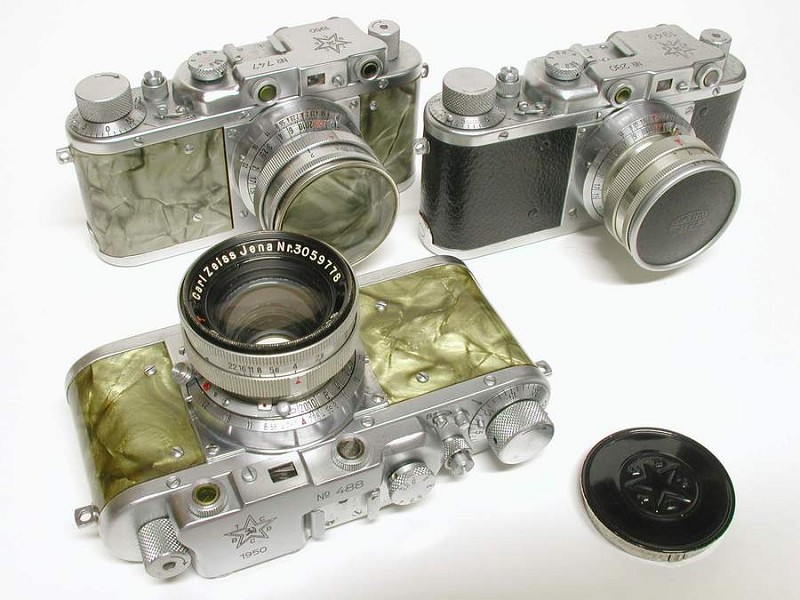
http://www.ussrphoto.com/UserContent/2642010_TSVVS 1.jpg

http://www.ussrphoto.com/UserContent/2642010_TSVVS 2.jpg
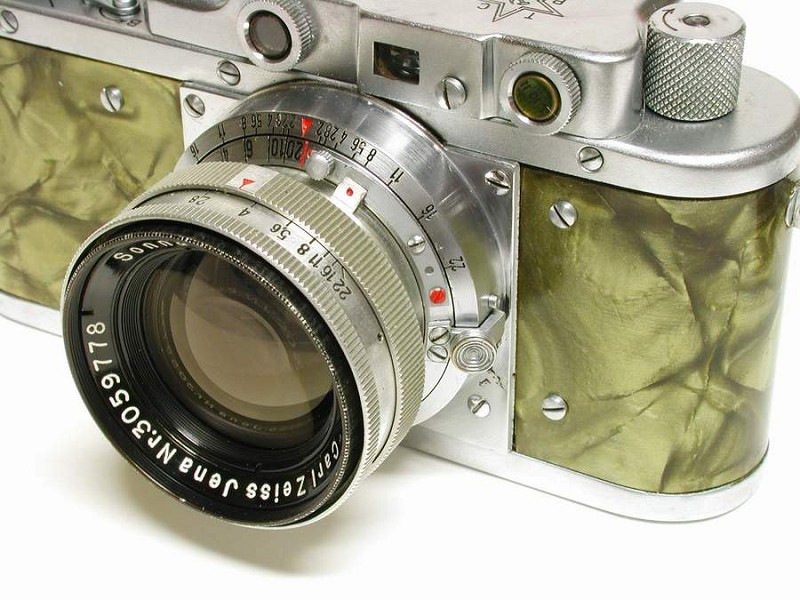
http://www.ussrphoto.com/UserContent/2642010_TSVVS 3.jpg
|
| nightphoto |
Posted - Apr 26 2010 : 2:52:36 PM
Here you can see close-up photos of the impressed number (in this case "63" that Milos was talking about, on one of my TSVVS ( No. 577).
On the bottom plate:
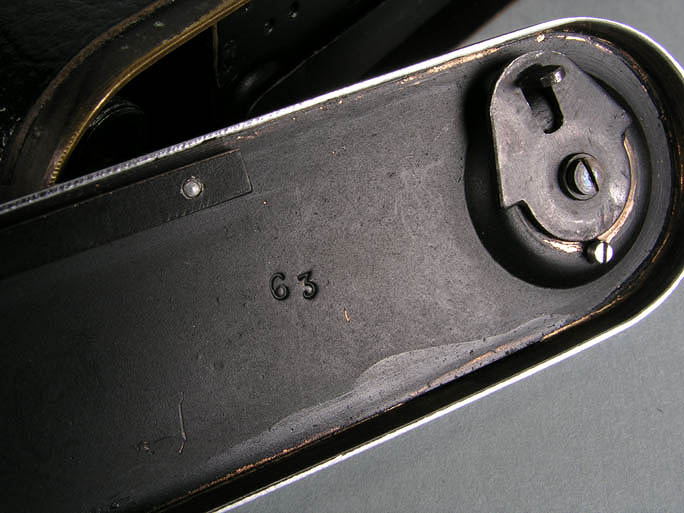
http://www.ussrphoto.com/UserContent/2642010_TSVVS21.jpg
On the bottom of the shutter cage assembly:
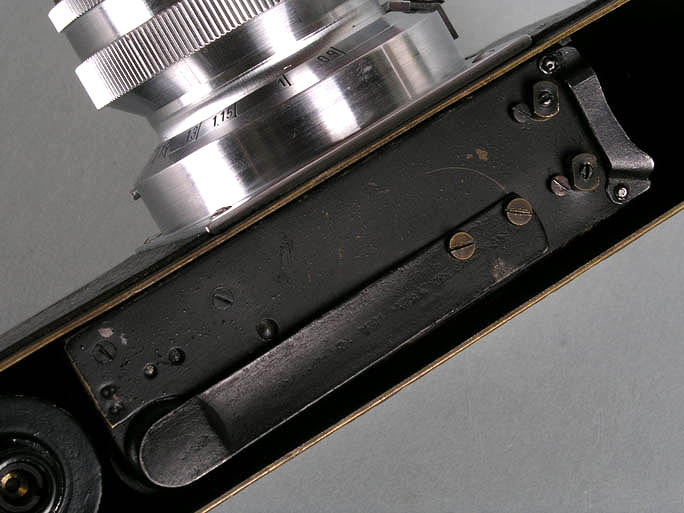
http://www.ussrphoto.com/UserContent/2642010_TSVVS22.jpg
Here you can see those and other close-ups of the same camera (click on photos to enlarge):
http://www.nightphoto.com/TSVVS.html
Regards, Bill
|
| Bull Halsey |
Posted - Apr 26 2010 : 2:06:24 PM
As long as we're talking numbers.....
1. The number 8 is located as Vlad described, in the body as well as centered under the film spacing bar of the baseplate.
2. Would someone please add the serial numbers of my camera to the WIKI? The Body #816, and the 50mm F.2 Jena Sonnar #2019243. Can this be correct? Seems very low for the higher body number. Could have been exchanged at one time.
Steve |
| Vlad |
Posted - Apr 26 2010 : 1:15:55 PM
On Steve's camera when you open a bottom plate it has a little "8" stamped into the bottom of shutter assembly. |
| cedricfan |
Posted - Apr 26 2010 : 12:39:16 PM
quote:
Originally posted by Vlad
I have communicated back and forth with Mr. Larry Gubas of Zeisshistorica, and received a reply this morning from him that you may find interesting. Here's his letter:
quote:
Dr. Mladek has seen a good number of these cameras and has noticed a pressed metal numeric marking on an internal part which might prove helpful. He gave me images of these markings and the images of 3 cameras when I visited him nearly 6 years ago.
So what is this possibly helpful marking, very interested to hear 
Best regards,
Juhani |
| Jacques M. |
Posted - Apr 26 2010 : 11:45:34 AM
Just in addition to this topic, about lenses.
One of my friends made comparisons between Contax, Nikon rangefinder and TSVVS. And their lenses : can any lens mechanically be put on any body? (no question of depth of field here).
The answer is no. The TSVVS-Zeiss lens can be mounted on the two other bodies, not the reverse, even for the ordinary Zeiss Sonnar which cannot be put on the TSVVS. As if something inside the TSVVS mount was different from the Contax one (and Nikon's). But what exactly?
I have checked that but between TSVVS and Contax II: I don't have any Nikon. Strange...
Amitiés. Jacques.
|
| Vlad |
Posted - Apr 26 2010 : 09:04:44 AM
I have communicated back and forth with Mr. Larry Gubas of Zeisshistorica, and received a reply this morning from him that you may find interesting. Here's his letter:
quote:
Hello Vlad,
I understand the point that information such as Jean Loup's can become dated quite quickly but it was an excellent starting point. As I said, I have no direct knowledge of this camera but rather most of what I know came from Dr. Mladek and him.
I do know a gentleman that was in Zeiss Jena for the time of the construction of the Jena Contax and he shared a great deal with me and I did interview a Zeiss engineer who was in charge of the physical move from Jena to Kiev for the Volga/Kiev camera but he was well over 90 years old when I met him nearly 6 years ago and has since died.
Neither of them mentioned this camera as a product of the work in Jena or Kiev but then I was unaware of this camera and did not ask the necessary question. my friend still lives in Jena but does not use a computer or email and so a question to him will take some time to transmit and receive. However, he was most thorough in his discussions with me and would be surprised to find that he had not mentioned it to me. I will check but it will take some time. He also worked in the photography department in Jena and Saalfeld for Zeiss and would have known if such a camera was manufactured there.
I would suspect that some Leitz craftsmen might have been gathered to go to Russia and improved the camera product of the Fed but that is just suspicion. The camera does seem to have a lot of Fed like elements. The use of Zeiss lenses on the Leica copies was part of an order to Zeiss Jena by the Russian officers after they arrived in Jena and Zeiss was familiar with the M 39 screw mount as they had manufactured Zeiss lenses for the Leica based on German military orders but the use of the lenses on this camera seems quite odd as it would seem to limit the range of the lenses.
Dr. Mladek has seen a good number of these cameras and has noticed a pressed metal numeric marking on an internal part which might prove helpful. He gave me images of these markings and the images of 3 cameras when I visited him nearly 6 years ago. I am presently limited in my ability to travel due to health reasons and must maintain my presence in my local surroundings for the present and so travel to visit him and others is out for the present.
I will contact you if I hear anything definitive from my friend in Jena.
Larry
|
| Vlad |
Posted - Apr 25 2010 : 7:05:21 PM
FYI, I've renamed this topic to be more general since it's tied to the Wiki entry.
cheers,
Vlad. |
| Vlad |
Posted - Apr 25 2010 : 6:18:30 PM
I've shot Zeisshistorica an email, we'll see if they come back with anything, it would be awesome if they do!
Cheers,
Vlad |
| Vlad |
Posted - Apr 25 2010 : 6:09:50 PM
Oh I see  . I may send them an email, I just meant in general that you may have better access to Zeiss experts in Germany, no? . I may send them an email, I just meant in general that you may have better access to Zeiss experts in Germany, no?
Cheers,
Vlad. |
| uwittehh |
Posted - Apr 25 2010 : 02:09:25 AM
Vlad, I don't have contacts to Zeisshistorica. And they are not located in Germany, they are in USA :-) Just take a look at their website:
http://zeisshistorica.org/
So I think that it it better when some native speaker contact them.
Ulrich
http://fotos.cconin.de |
| Vlad |
Posted - Apr 24 2010 : 9:50:44 PM
Very interesting indeed, this is the first of such type of "real" information that I've heard beyond the speculation of collectors.
Ulrich, if you have contacts with Zeisshistorica we would greatly appreciate any follow up on this! Being in Germany puts you into unique research position  . .
Cheers,
Vlad |
| nightphoto |
Posted - Apr 24 2010 : 5:46:05 PM
Hi Vlad and Hi to Alexey since you are watching this thread!
To me, this information from Alexey Nikitin sounds authentic and his source that he talked with personally would have no reason to make up a story like this. Alexey is a very knowledgeable and honest collector and was lucky and smart to get this information. Thanks Alexey and to Vlad also for relaying it to us!
Now, if we can figure out which factory in USSR Occupied Germany (if this is the case) made them! Possibly Zeiss Jena, but much research has been done on that factory and output during the time period and no one mentions the TSVVS... but still a possibility.
Regards, Bill
|
| uwittehh |
Posted - Apr 24 2010 : 5:23:37 PM
Vlad,
that sounds really interesting. So if the TSVVS was just an order of the soviets to build 1000 cameras in occupied germany that days there must be some german workers and engineers that have built and constructed them.
Maybe it's a good idea to ask the zeisshistorica.org if they know something about such an order?
Ulrich
http://fotos.cconin.de |
| Vlad |
Posted - Apr 24 2010 : 5:00:11 PM
I've got an email from Alexey Nikitin about this thread. He had sent me some pictures of a 1950 TSVVS/VTSVS that was sold on Molotok.ru. He had talked with the owner of the camera on the phone. The owner had told him that when he was still a boy, his family lived in Germany and his father was an army man in Soviet army in the division that was stationed in Germany. His father had made a deal with some other ensign about buying an illegal camera TSVVS from warehouse there. And the camera No756 was bought in Germany for 15 soviet rubles in some military base. From the conversation Alexey understood that from that warehouse you could buy more than one TSVVS camera. The owner said the camera didn't take really good pictures, later his Zenit was better.
And here's Alexey opinion about the origins of TSVVS: it was very simply for Soviet command or civil higher ranks just to order 1000 cameras styled after FED from German captured firms with Soviet presentation symbolics. And since there is 1949 camera - 1950 means there was an additional order.
The threshold of serial #s from 1949 to 1950 is between #311(Alexey's) and #330 which is already 1950. This means about 330 pieces were in 1949 and the rest (670 pieces) in 1950. There is also different versions of font of the writing for the year, since approx #471 there is small font for the year. (he saw #372 with large and #471 with small).
Also he wrote me about Alexander Bronstein's camera that says to "Colonel Maksimov A.K. for long and exemplary military service in divisions VTS S.A. from head of VTS".
But I think we already talked about that, VTS is Miltary Topographical Service and S.A. is Soviet Army.
Cheers,
Vlad. |
| stephanvdz |
Posted - Apr 22 2010 : 2:44:34 PM
is anyone in contact with a university with a metallurgic department ?
Stephan |
| stephanvdz |
Posted - Apr 22 2010 : 2:43:25 PM
the main problem is to get some metal ingeneer to analyse the metal... to see where it comes from...
Stephan |
| Vlad |
Posted - Apr 22 2010 : 12:54:16 PM
Stephan, Bill, both your theories seem much more plausible to me after I've actually handled the camera. I know we all have this gut feeling at this point after handling hundreds of different cameras from different parts of the world, that we can kind of say where it was made by the construction and quality of materials, and in this case just the overall feel of it screams non-Soviet. I agree Jena is the most probable source when theorizing, but what about this idea put forward by Steve that it may be Japanese?
Stephan, I only saw this one upclose, maybe Bill or Steve could answer your questions..
Cheers,
Vlad |
| Jacques M. |
Posted - Apr 22 2010 : 10:58:26 AM
A very good idea, Stephan, as the Contax "Jena" is said to be heavier than the normal Contax II.
Jacques.
|
| stephanvdz |
Posted - Apr 22 2010 : 10:04:44 AM
may be it's simpler
if the dates are really 1948,1949,1950... it could have been done in Germany like the "Jena" Contax with which it share lenses... in the same factory... if anyone has a "Jena contax" and a period TVSS it could be interesting to have a "metal" laboratory inspecting the alloy...
S.
Stephan |
| stephanvdz |
Posted - Apr 22 2010 : 09:58:39 AM
some question and hypothesis ?
- are there any TVSS with the outer zeiss bayonet working ?
- since early TVSS all have prewar uncoated 1,5 lenses... could it be that they were build in Germany before or during the war... and re-engraved as soviet product...
- later piece being made somewhere by former (zeiss or else) employees...with modern lenses
let's be wild... imagine Zeiss engineer asked by the german military or a someone at the factory to make a leica lookalike... trying to be as light as a leica, but with zeiss bayonet... on the other hand Zeiss lenses were adapted for leica anyway... why wouldn't they explore both way to satisfy the military request ? (Zeiss lenses in LTM, and Leica bodies in Contax mount...). Zeiss would have done that secretly because even in wartime, germany was a capitalist country with patent legislation... so a Leica copy would have been prosecuted.
After the war, Nikon did it... a nikon S being a contax with a "soft" shutter curtain... but they didn't care for patent...and the mount was slightly different
In a way, TVSS would be the missing link...
Stephan |
| nightphoto |
Posted - Apr 21 2010 : 8:52:27 PM
Hi Vlad,
I basically agree with you. I have often thought that the TSVVS - VTS-VS was actually made in Germany, most likely at a Zeiss workshop. The mount being similar to Contax, the small number impressed on the inside of the base-plate and shutter cage (just like Contax) and the use of Zeiss lenses, both pre-war and post-war, as well as the overall quality and the superb finish all lead to this conclusion, in my opinion.
One scenario is that it was commissioned to be made at a Zeiss workshop, by German craftsmen, in order for high ranking officials to be able to have a Soviet camera that was of the quality of the Leica mechanism and the Zeiss optics. In my opinion, since the Communist doctrine did not really officially allow the higher ranks to have better stuff, it was made for the Topographical Service officially, but given to Generals, Colonels, etc. since the Topographical Service probably didn't really have a need for a camera like this.
However, it is all supposition unless some documentation or actual eyewitness statement surfaces. It may be that there is little or no documentation due to the idea that it was made as a special thing for important people.
I can not see it as Soviet built in any way either. Just made and marked for Soviet Military!
Regards, Bill
|
| Vlad |
Posted - Apr 21 2010 : 7:45:02 PM
Hello All,
So thanks to Steve Berkowitz I've finally had a chance to hold the TSVVS or VTS-VS in my own hands for a while and to play with it. From pictures it looks like a Soviet camera but here's my personal opinion after I've held it and you can disagree with me: No way in hell this camera was made anywhere in Soviet Union. I know, strong words, but I am convinced. The chrome is too fine and smooth, the leather is unlike anything I've ever seen come out from USSR, the shutter operated so smoothly after all these years, materials used are unlike anything - the brass body, the shutter dial engraving style, the shutter dial itself - it's unlike anything I've seen or handled or touched that ever come out from USSR, the assembly of the camera itself was almost perfect. When I was holding it and looking at it and winding and clicking it, I realized that the story of the factory Almaz actually making it cannot be true in my opinion. There is absolutely no way the factory that is not known to make any cameras before could EVER (EVER!) pull off the best finishing/looking/working camera I've ever seen or touched that was made in Soviet Union. Even KMZ with their best cameras could not approach the quality of manufacture of TSVVS when you look at it closely and even feel it when you wind it up and click it. The only people who could produce it would have to have at least decades of training and experience making cameras. It must be either Germans or as Steve suggested even possibly Japanese manufacture. It was either an order made to occupied Germans or Japanese to make these for Soviet upper echelon ranks or it was a stash of cameras somehow found in occupied Germany and re-stamped with Soviet symbolics. That is my opinion after I handled the camera. I think it's Zeiss-made.
Vlad |
| Jacques M. |
Posted - Sep 11 2008 : 06:50:34 AM
Thanks, Vlad.
Surprising...
Jacques.
|
| cedricfan |
Posted - Sep 10 2008 : 11:29:57 PM
1957? A used camera or very old stock even in USSR?
Smena rules |
| Vlad |
Posted - Sep 10 2008 : 10:05:14 PM
OK, I blew it up in Photoshop and whatever I could make out says "To Colonel Maksimov for [something something, probably good]service in VTS (Voyenno Transportnih Sluzhb - Military Transport Services, I would assume or Technical Services) from the chief of VTS, December something, 1957"...
Vlad |
| Vlad |
Posted - Sep 10 2008 : 9:58:42 PM
Jacques, I would be happy to translate it, but it's too small and fuzzy.. Bill, is there a better image by any chance?
Vlad |
| Jacques M. |
Posted - Sep 10 2008 : 03:33:16 AM
Very interesting!
Could somebody translate what is said on this plaque? Thanks!
Amitiés. Jacques. |
| nightphoto |
Posted - Sep 09 2008 : 11:27:05 PM
Here are some other TSVVS cases, including one from Alexander Bronstein that has an engraved plaque on it! The first photo is one of my cameras.
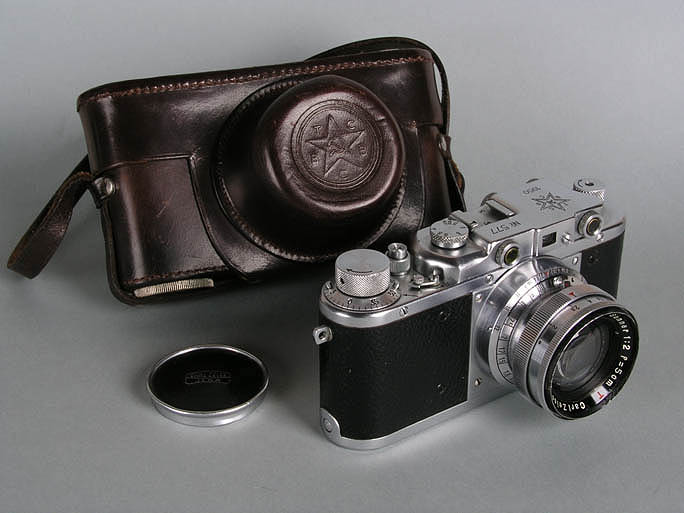
http://www.ussrphoto.com/UserContent/TSVVS1.jpg
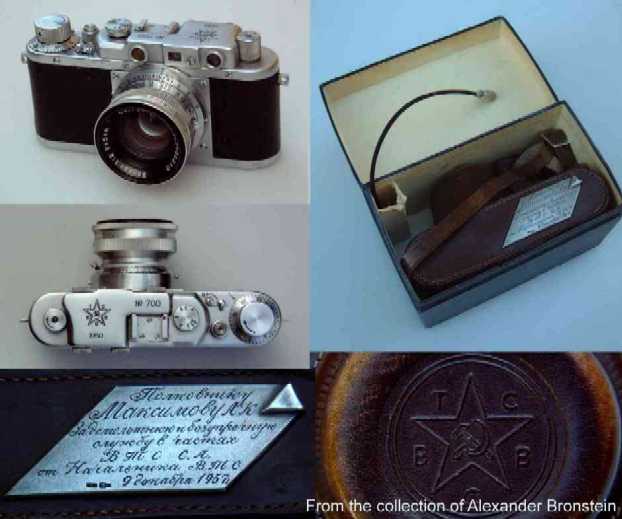
http://www.ussrphoto.com/UserContent/TSVVS-700 Bronstein.jpg
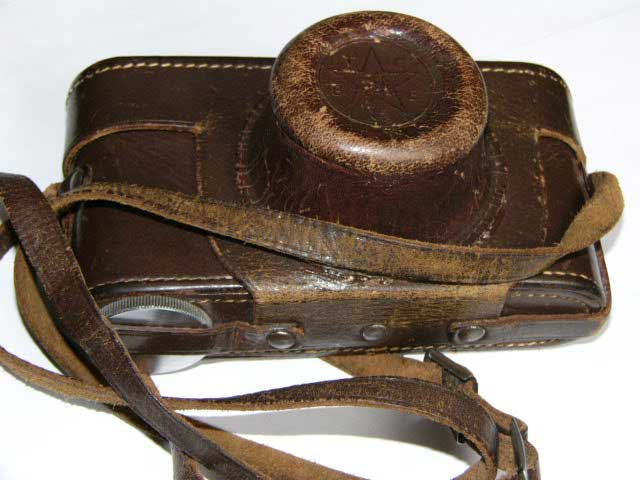
http://www.ussrphoto.com/UserContent/tsvvs_case.jpg
Regards, Bill
|
| Luiz Paracampo |
Posted - Aug 13 2008 : 4:02:24 PM
Vlad
If you want I will show you a TSVVS 3!
LP |
| Vlad |
Posted - Aug 12 2008 : 8:00:09 PM
I see! Thank you both! I thought that much, we just never brought it up here, wanted to hear your thoughts..
Luiz, you're still at it with the TSVVS-2, eh?  |
| stephanvdz |
Posted - Aug 12 2008 : 5:41:19 PM
the f2 lenses on the tvss are not warbooty lens... but post war (1948) Jena production (above 3000000)
If it would have been war booty they would have been 28***** or 29*****... THose lenses were modified to ZK lenses but kept their number on the rear lens part...
By the way I just spotted a Contax mount f2 collapsible in the 293**** from a batch that should have been ZKised...
Stephan |
| Luiz Paracampo |
Posted - Aug 12 2008 : 4:54:38 PM
Vlad
Certainly TSVVS cameras were never built at FED Factory. Even they managed together The War Air force. This affirmation I sustain since I was a simple observer at Zeiss distributor in Brazil when I was only 12. and learned to repair such cameras Then, all Zeiss cameras from Contax to the simplest Nettar had similar characteristics , Chrome, enamel, types of leatherette , screw standards, rivets, mirrors and finder lenses.
All FEDs and all TSVVSs, differ completely in thier materials although they have similar design. They were done at different factories by different engeneers.
The same way the TSVVS2? although share the same tecnical lay out of FED 2 although are completely different in their choice of materials workmanship and construction. |
| Vlad |
Posted - Aug 12 2008 : 3:51:13 PM
Unrelated topic to previous discussion: This had never came up what but what are your all opinion in regards to JLP saying that TSVVS was made by FED when Ministry of Aeronautical Affairs (quoting..)"bestowed on FED a few hundred Zeiss Sonnar lenses, a tiny part of the "war booty" recovered in Germany by the Red Army"? Was this theory pretty much disproved?
Vlad |
| Jacques M. |
Posted - Jul 28 2008 : 3:33:54 PM
I totally agree with you, Luis.
Before the fifties, the fact to have a lens coated or not was not of great importance. But after, it was different with coloured pictures...
I bought a Fed-Zorki 1948 with a non original coated lens (K360 for JLP) some months ago. The seller told me that the owner -his father- had changed the lens to make coloured dias...
Amitiés. Jacques.
|
| Luiz Paracampo |
Posted - Jul 28 2008 : 09:44:20 AM
Stephan
That is true but at post war period, coated lenses were not so important. See that 1947 FED/Zorki came with uncoated FED lenses (not ZK lenses, -coated from the begining) and also several german lenses in German cameras. In that era American Wollensak. Elgeet , Baush&Lomb and kodak lenssed were "lumenized" "Balcoated" and "Wolcoated" much more as strong commercial selling points.
In 1946/1947 Mrs Cook&Perkings from England produced special adapters to use inner and outer RF Contax bayonet lenses on Leica. In 1950, Orion Miranda produced this same item together "Mirax" a reflex cage that transforms both Leica and Contax into a reflex camera.Also furnished was a special short mount 135mm lens.
Russians already had the Zenit camera.
LP |
| stephanvdz |
Posted - Jul 27 2008 : 8:01:30 PM
sonnars are complicated...
but it doesnt explain why they used non coated lenses on a camera that would have been the nec plus ultra of societ photography when they are supposed to be constructed...
and why they didn't take the external bayonette option...
Stephan |
| Luiz Paracampo |
Posted - Jul 27 2008 : 5:52:40 PM
Stephan
In order to complicate things:
at http://www.novacon.com.br/odditycameras/Opema.htm there is a 1951 Opema with un uncoated 1.5 Sonnar 5.8cm! these cameras from small batch used pre-war CZ lenses in original Meopta mounts!
Regards LP |
| stephanvdz |
Posted - Jul 27 2008 : 3:45:32 PM
sonnar 1,5 were made in quantity but I doubt that a 1938 batch would have been available in 1945... and if the Almaz connection is right why would they go for uncoated when coated batches were available...
Pre-45 Coated Sonnars 1,5 T were indeed largely military lenses, not the uncoated version... but they have no military marks...
Stephan |
| Luiz Paracampo |
Posted - Jul 27 2008 : 3:28:48 PM
Stephan
1) As I know, 1.5 Sonnars were made in large quantities in the prewar. In Contax mount, Leica mount and unmounted! This was under Government requirements and were used on Army, Air Force and Gestapo.
Lots of them becamer war surplus when the war finished.
These lenses were employed in several cameras Wica from Austria, Opema from Czecoslovakia Balerio from Italy to say few. and even on The famous Jena Contax. See Asquini/Pegorari Several of them went to Russia as war indenization, and were also used.
Mr James Small may have further explanations.
2) TSVVS positively cannot receive other than normal Contax/Kiev lenses.
3) You are absolutely right on dating TSVVS from its Jena Sonnar f2 lenses. and so, the possible "TSVVS-2"? as I previously have done.
Regards LP |
| Vlad |
Posted - Jul 27 2008 : 12:24:56 PM
From what I heard there will be an exhaustive article with research and cited sources about the origins of the TSVVS in the new Viktor Suglob's book. It is kept currently under wraps until the book is out. Waiting anxiously!!  |
| stephanvdz |
Posted - Jul 27 2008 : 11:53:22 AM
There is one assertion by Yuriy that is totally false : the use of various lenses... with the limited mount A tvss can only use 50mm lenses... and btw the contax mount is far more difficult to change than a LTM, even if it less prone to misbehaviour and pathologies ;-)
I need to see a real TVSS in order to assess if they are or not compatible with other focal length contax mount lenses...
Stephan |
| nightphoto |
Posted - Jul 26 2008 : 10:16:17 PM
Stephan,
Thanks for your very astute observation about the TSVVS.
I have both a 1949 and a 1950 model of the camera and will examine them to see if the mount is the same for both in every detail ... but I think it is.
I believe that there are some TSVVS cameras that may have been made before 1949. I am very interested in the mystery of where these cameras were made and have noticed some unusual traits to them. For example, they have impressed numbers on the bottom of the shutter cage, very much the way the Contax does.
I think your hypothesis is very interesting and a very good question to be investigated. These TSVVS are very different from the FED-1 and any other Russian camera that I know. Maybe they were designed during the war, or possibly right after the war. Maybe they were originally made in Germany? These are more questions that may be worthy of investigation.
Here is a link to the page about TSVVS on the DVD Tech site that may be intersting to you if you have not seen it, although the essay by Yuriy Davidenko about the origin of TSVVS has not been proved (or approved by other collectors as far as I know) and he gives no references as to where he has found this information from.
http://www.dvdtechcameras.com/collect/fed/fed.htm
Thank you for bringing this lens observation to our attention.
Regards, Bill
|
|
|
